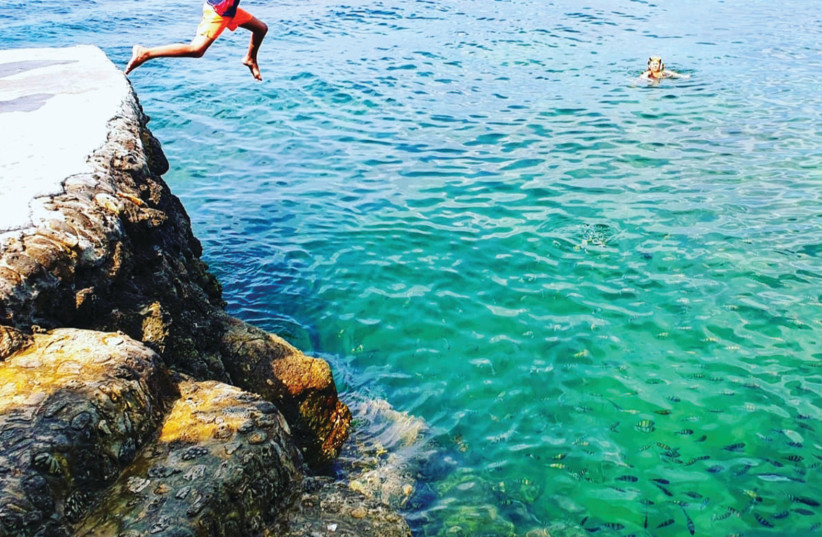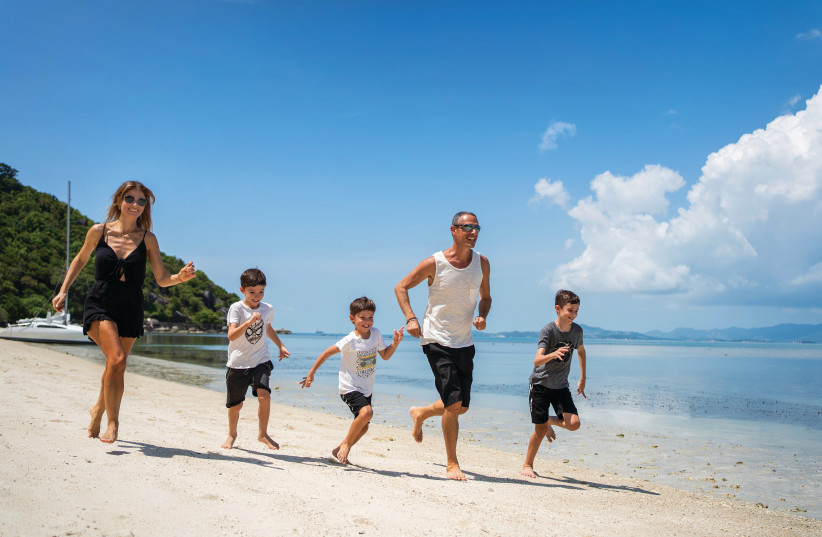Seems as though Arik (Harry) and Efrat Rozental have taken a leaf out of Theodor Herzl’s book.
“If you will it, it is no dream,” the Zionist leader famously posited back in the late 19th century when doing his best to drum up support for a Jewish homeland. It could just as well serve as the Rozental’s byword too.
On the other hand, considering the fortysomething couple are advocating getting away from the country, at least for a while, perhaps that is something of an anomaly. But the principle is the same. If you have a hankering for something just grab the bull by both horns and go for it.
Seven and a half years ago, Arik and Efrat Rozental were what the former calls “a normative family getting on with their lives.” It may have been “normal” but it was hardly spiritually or physically wholesome. “We were both working hard. It was crazy,” says Efrat. “We’d sit at opposite ends of the dining room table. Arik with his computer, I with mine. We’d communicate with each other via Whatsapp,” she says with a laugh when we meet at their rented eighth floor apartment in Givatayim. I wasn’t sure if she meant that literally, but their routine back then seemed anything but balanced and suitable for engendering a calm, healthy ambience for raising a family.
“We’d sit at opposite ends of the dining room table. Arik with his computer, I with mine. We’d communicate with each other via Whatsapp.”
Efrat Rozental
At the time, the Rozentals had three young sons. It was Arik who triggered the tripwire that led to the family going on a seemingly wild and whacky adventure to Thailand. “We were working really long hours. I hardly saw Efrat or the kids,” he recalls. It was an epiphanous juncture. “I was 40 years old. All I could see ahead of me was carrying on working like that and looking forward to my pension.” That, he realized, was not going to pass muster further on down his life continuum. It was an itch that was not going to go away.

This was going to be a seismic lifestyle shift which Efrat struggled to accommodate. “I had a great job which I loved,” she says. “I had studied psychology, and I was a human resources manager. I got on well with my colleagues. I was earning well. Why would I want to change all of that?”
They say that opposites attract, and the Rozentals had diametrically contrasting ideas about the way forward. “I felt I needed security,” Efrat continues. “Make a good living, have family and friends close by, kupat cholim (health care provider) and all the rest.” Arik had a very different take on things. “I felt life was just too busy. I felt I was running around after my own tail and I just couldn’t carry on like that.”
Tension ensued. “At one point someone even suggested we just go our different ways,” Arik recalls. Happily that didn’t happen, and Efrat gradually came round. “It took four years,” he says, “but we got there.” By then Efrat was fully primed for discussions about the future. “He didn’t really have to say anything. I could tell what he wanted to say just by the expression on his face,” she smiles.
Efrat may have been making good headway on the professional front but she was paying a heavy price. “I lost my voice because of all the work-related stress,” she recalls. “I was on sick leave for a few months at a time.”
It was time for lift off. The fivesome packed some bags and headed for Thailand, doing the rounds of the country before eventually settling on Ko Pha Ngan, an idyllic island in the Gulf of Thailand, to the east of the mainland strip that runs down to Malaysia. It was a case of rat race lost and paradise found.
Going to Thailand, weathering the COVID storm
THAT WAS in September 2019. They quickly slipped seamlessly into the tranquil vibe of the place, taking up residence in a house a hop, skip and jump from a coconut tree-lined beach complete with picture book white sands and azure sea. Meanwhile, Efrat eventually stopped extending her sick leave and made the break permanent.
Over time, the couple documented snapshots of their life on the Thai island, with photographs and videos, along with posts mostly written by Efrat, on Facebook and Instagram. The fact that Arik studied communications, including filmmaking, when he was younger also helped to chronicle developments over the close to three years the Rozentals spent in Thailand, and get the story out to the world.
In one video, for example, we see the three boys – Ofek, Liad and Or, now aged 13-7 – gamboling through the waves, and Or learning the Hebrew alphabet from letters written in the sand. What could be more sensorially stimulating, natural and child-friendly than playing on a beach and learning how to read and write? That conjures up a very different, and far more child dynamics-oriented picture, compared with the regular scenario of kids sitting obediently at desks 6-8 hours a day, accumulating facts and figures.
One of Efrat’s many concerns, that gnawed at her before she eventually decided to join in her husband’s dream, was taking her children out of their school frameworks and how they would manage without the regular, far more socially acceptable, educational structure. Seems the kids managed just fine with a mix of homeschooling and attending an English-speaking institution on the island. They are now back in “more normal” school settings here, bringing the life lessons they accrued in Thailand to their social lives and academic activities
That was, if you can cast your mind back to a now seemingly distant time, before most of us had even heard the term coronavirus. “This has been an incredible journey, but it hasn’t all been rosy,” Ark points out. Doubts began to crop up in March 2020:
“We were on this wonderful island and we had no idea what was going to happen. We realized the world was being closed off from us. Israel was arranging flights to get everybody home before it was too late. We didn’t know whether there would even be supplies of food and other things which only came to Ko Pha Ngan by boat,” Efrat adds. “It was a very dramatic moment.”
After a couple of days of deliberation they decided the island was the best place to be, to weather the global storm. Back here, of course, things were very different. “We had no lockdowns and all the other stuff,” says Arik. The boys did, however, have to wear masks at school.
“When I am not sure about a step I need to make I write,” Efrat adds. “I wrote things down and I looked at the sea and the peaceful waves. I thought, even if the virus gets here, who is going to infect us? We are alone here on this island, with our own beach. I told Arik we are in the best and safest place we could possibly be.” Time proved her right.
Arik says he had misgivings about posting vignettes of their seemingly carefree life in Thailand while the Rozentals’ families and friends went through the Ministry of Health-imposed constraint grinder. “I wondered how people would react to what we were posting,” he says. “We saw the chaos and panic here. I worried they would think we were flaunting our wonderful life, with the sunsets, pineapples, the beach and everything else. I don’t think there was another place in the world where life just went on as normal, through the pandemic.”
In the event, he needn’t have worried. The couple say their experiences, and break for freedom, have helped to fire the imagination of thousands who follow their online accounts. “People have told us how we helped them to rediscover their own ambitions and dreams, and to reconsider how they live,” says Arik. It seems they built up quite a following. “There was even a get-together in Hayarkon Park, of people who were inspired by our story and wanted to do something similar, to get off the merry-go-round of their safe humdrum lives but just hadn’t had the courage to do so.”

Returning to Israel and the Thai tourism PR
SINCE THEIR return, last Passover, Arik has given talks about their Thai odyssey to packed houses. Clearly the Rozentals’ decision to take a jump off the treadmill of material comforts struck a chord. “It has been amazing to get all this feedback,” he says.
That has not just come from Israelis harboring similar dreams but who had been keeping them under wraps for years. There has been some substantial official recognition from the Tourism Authority of Thailand (TAT) which got wind of the Rozentals’ goings-on and decided they could work with it. “We opened our Facebook page in May 2020,” Arik recalls. “Two months later the TAT contacted us.”
It all made perfect PR-economic sense. “Thailand’s main source of revenue is tourism,” he explains. “They really liked our story and they wanted to show that Thailand is still Thailand, even if the skies were closed off for a while.” The Rozentals were duly sent to resorts and vacation locations all over the country, naturally documenting their fun en route, getting the word out to Israelis that, even with the pandemic still around, Thailand awaited them.
And so it came to be. The Bangkok Post ran a couple of articles noting the astounding statistic that, in late 2021, the number of Israeli tourists placed second only to the US, and ahead of the UK, a country of close to 70 million people. Considering the enormous difference in population sizes that is impressive.
“The TAT suggested we serve as sort of ambassadors for Thai tourism,” says Arik. “That’s incredible. We never planned on that. Since then people from Rwanda and other countries have also talked to us about possibly doing something similar there. This is quite unbelievable.”
“We are going to be leaving again soon, maybe for five years, maybe longer.”
Arik Rozental
One thing is for sure, the Rozental family are not going to stick around here for too long. “We are going to be leaving again soon, maybe for five years, maybe longer,” says Arik. “We want to wait until Naya is a bit bigger before we go,” Efrat adds. Naya is the couple’s four-month-old daughter who slept soundly while we chatted in the living room in Givatayim. “That’s another dream come true,” says Efrat. “I always wanted a daughter. I had her at the age of 44. Not an easy thing to do.”
There doesn’t seem to be anything to stop the Rozentals as they continue on their journey, living Arik’s dream which the whole family now shares. “We have cracked the code of squaring up to fears,” he says. “We have taught our children how to do that, not to run away from fears and doubts. They don’t fear change. They feel able to manage all of that.”
Arik says they want to spread the word as far and wide as possible. “It wouldn’t be going too far to say we have found our mission in life. We can do it. Anyone can do it. Just go for your dreams. You just need to take that first step.”
The Rozentals call their venture OLO - Only Live Once which, neatly, just happens to be the first letters of their sons’ names. Sounds like a perfect seasonal fit, as we celebrate our release from bondage in Egypt to freedom.■
For more information: https://www.facebook.com/OLO.Only.Live.Once.1/, https://instagram.com/olo_only.live.once
